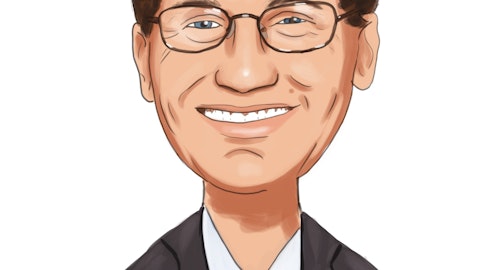Debbie Cunningham: Right. Yes, we — I mean, generally speaking, we target 10-day ranges. So right now, in our prime funds, we’re at 40 to 50 days; our govy funds 35 days to 40 days; muni 40 days to 50 days as well. I mean the longest we’re ever going to get is 50 to 60 days. But even that, with the new daily and weekly liquid asset requirements that will come into being from an SEC rule requirement standpoint in April of 2024, it will be difficult to get up into the mid to high-50s. And given that there’s always a concern about whether there’s large clients that want to exit sort of know your client kind of discussions, I would guess maybe there’s another 10 days to 15 days extension, but not too much more than that.
Brian Bedell: Got it, got it. Okay. Great. And then on the ESG side, just — I guess just as this year has unfolded and all the political challenges we’ve seen for ESG, are you seeing any changes in demand for the ESG funds that you have rolled out? And if you can contrast the U.S. versus maybe what you’re seeing in Europe? And then how might that influence your future ESG product rollout strategy, both again in Europe versus U.S.?
Chris Donahue: So Brian, I’ll take that first, then I’ll let Saker comment on the European side. We did six-years of cultural due diligence with Hermes when we were looking at them from 2012 to 2018. And ESG was one of the main things. During that time, we also spent a lot of time figuring out how to be able to successfully say yes to the fiduciary with ESG. And then we have repeated the sounding joy of this work to the SEC, to the Department of Labor to the marketplace, where you have a Stanford Law review article that set forth all the research that had been done that basically says, if you’re a fiduciary, you have to be for the exclusive pecuniary interest of the underlying investor. And if you want an impact fund, that’s great, too.
And you can use the ESG features to analyze risk in order to improve returns. And we think this continues. Now you asked the question in light of, okay, political stuff and where are we and how does that affect us? Well, what we try to do is stay out of the politics and stay down the street of the performance of the funds. I would mention that there’s a recent study that came out of — well, it was a bunch of professors from University College UCD in Dublin. Oxford and Texas and Austin that basically concluded that engagement can reduce the risk in a portfolio or in an individual security, okay. So that’s an interesting one and a fair fight in the marketplace, reasonable people can disagree. But we are going to continue with our integration efforts.
We are going to continue. We’re looking at these points, the way we said we were to enhance performance as active managers that we are, but there is a big difference between basically even though there’s food fights in the U.S. on this, there’s a big difference between the basic U.S. structure and that in Europe. And I’ll let Saker talk about his role in overseas.
Saker Nusseibeh: Thank you very much, Chris. So just before we talk about overseas, I want to reemphasize something that Chris said about the way we look at ESG. To our mind, integrating ESG is a way of enhancing financial returns in the long-term. And because in the Hermes business, we see ourselves as a long-term institutional business, it has been our conviction and indeed our internal data shows that on average, it actually adds value over the long-term. So to us, this is part of enhancing returns Furthermore, we combine it with engagement through our stewardship business, EOS. As Chris has said, the new studies come out that actually supports previous studies that have come out that show that our type of engagement does enhance financial returns.





